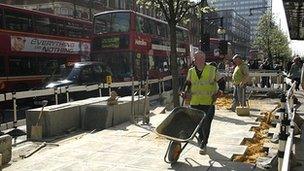Westminster parking: New plans for double yellow lines
- Published
Double yellow lines are to be added to more than 170 road junctions in central London so drivers cannot park alongside dropped kerbs, a council has said.
Currently there are single yellow lines at each of the locations but the changes, from 9 January, will help pedestrians, Tory-run Westminster said.
A campaign group said it was good news for users of wheelchairs and buggies.
But Labour councillors said the scheme would mean far fewer parking spaces in the West End on evenings and weekends.
The council said removing single yellow lines would let pedestrians cross more safely at many junctions, allow emergency-response vehicles better access to buildings, and enable drivers more easily to drop off passengers.
"We are keen to make Westminster a safer place for pedestrians and help drivers avoid parking where it may be unsafe or inconsiderate to others," said Councillor Lee Rowley, the cabinet member for parking and transport.
'Forced to pay'
Labour argued, however, that the council's strategy would remove 1,191 off-peak parking spaces, as vehicles which could be left on the single yellow lines at present would be barred from the double yellow lines.

Dozens of sites around central London would be converted under plans to change road layouts
The decision would "force many West End evening visitors and people working in West End theatres, restaurants, clubs, casinos to pay up to £20 a night to park on a parking meter bay or car park", said Councillor Paul Dimoldenberg, leader of the Labour group.
Westminster Older People's Action, an independent campaign group for local residents, said it was "wholeheartedly in favour" of the plan to convert kerbs which had been lowered.
It would become easier for pedestrians to "get off the pavement easily", it added.
Westminster Council generated controversy this year when it proposed to extend West End parking charges during weekends and evenings.
The plans are on hold while a judicial review is conducted.
- Published16 December 2011
- Published15 December 2011
- Published2 August 2011
- Published20 July 2011